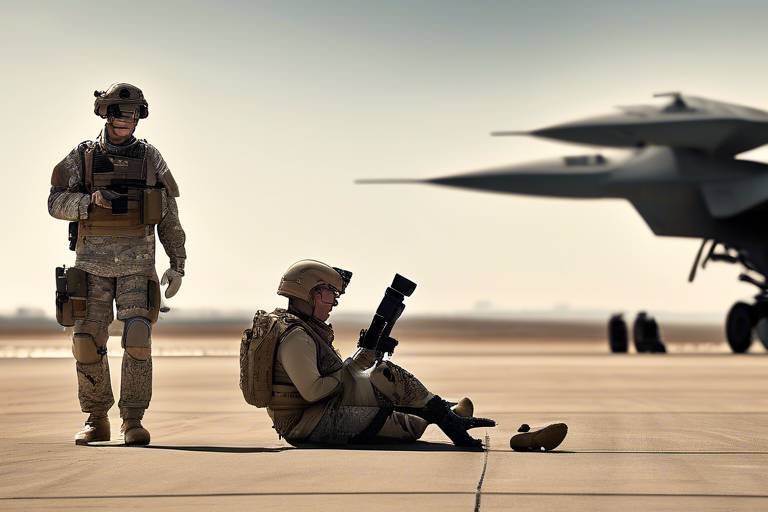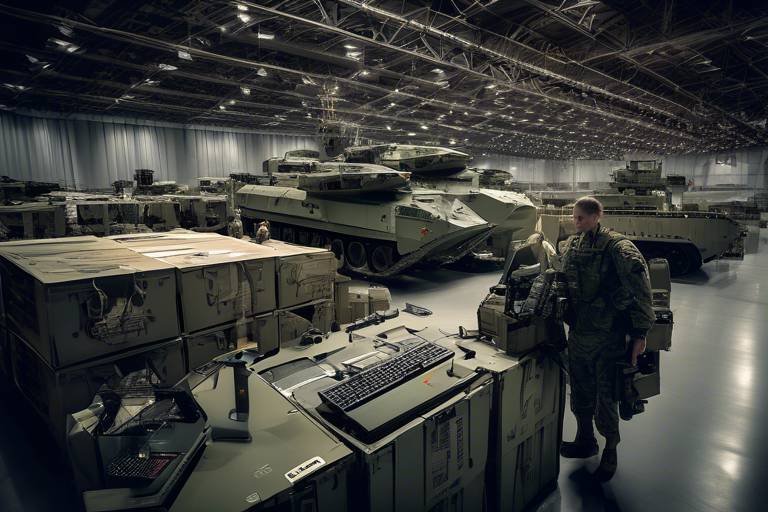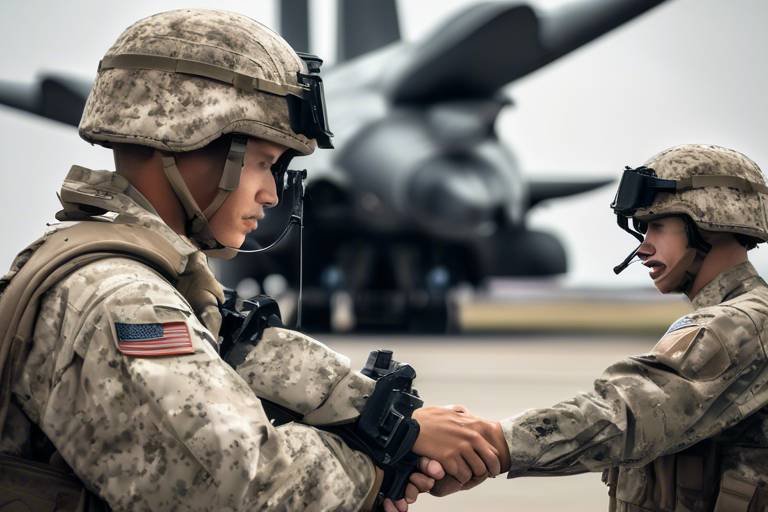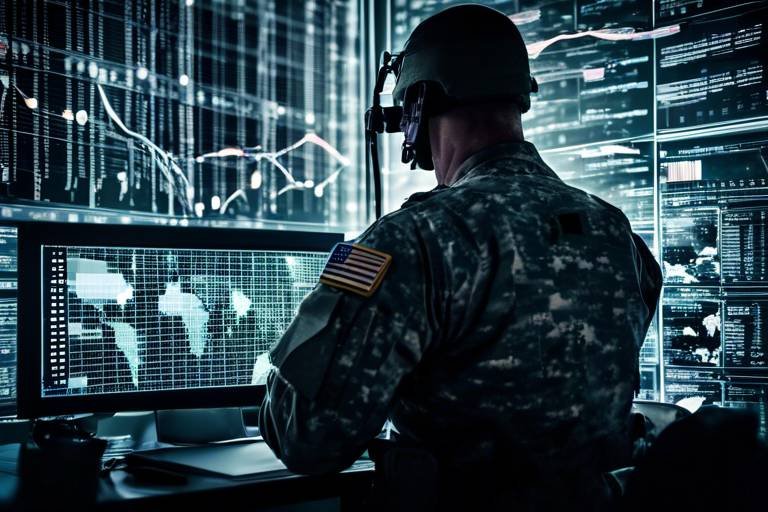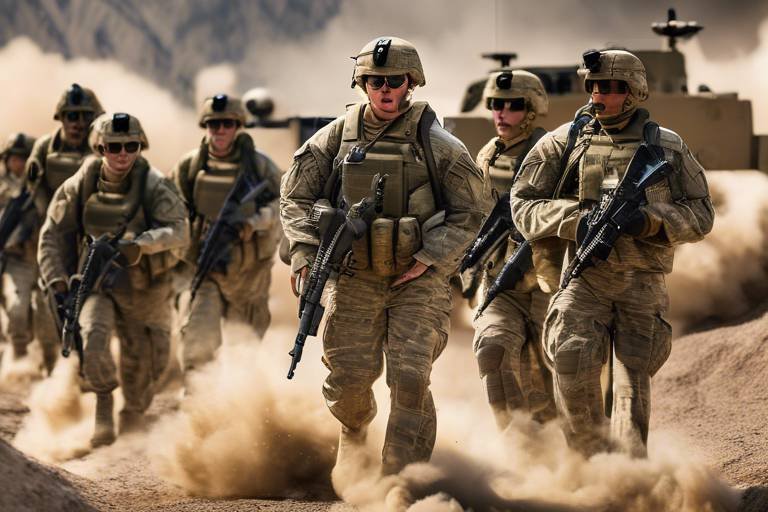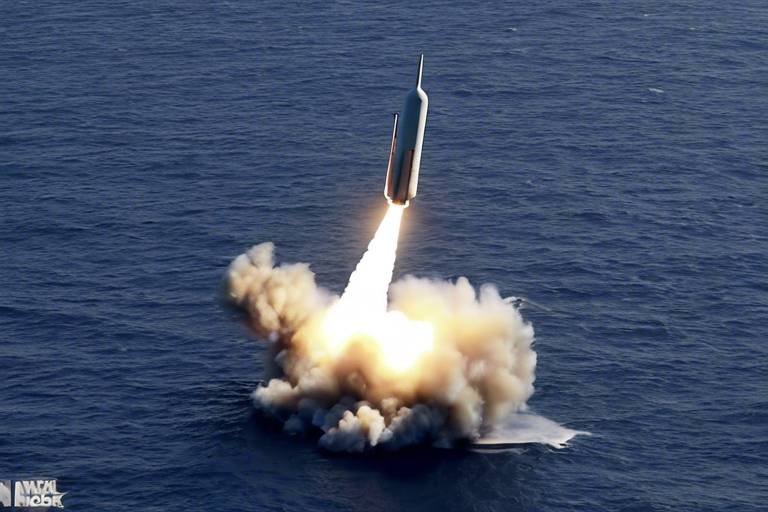The Role of AI in Modern Defense Systems
In today's rapidly evolving world, the integration of artificial intelligence (AI) into defense systems is not just a trend; it's a game changer. Imagine a future where military operations are not solely reliant on human decision-making but are enhanced by intelligent systems capable of analyzing vast amounts of data in real-time. This transformation is reshaping how nations approach defense strategies, making them more efficient, responsive, and effective in addressing emerging threats. With AI at the helm, military engagements are becoming more precise, and operational efficiency is reaching unprecedented levels.
AI's influence is evident in various aspects of modern defense, from surveillance to logistics, and even in ethical considerations surrounding warfare. The capabilities of AI-powered systems allow for enhanced situational awareness, enabling military personnel to make informed decisions faster than ever before. As we delve deeper into the role of AI in defense, we will explore its applications, the challenges it presents, and the ethical implications that come with such advanced technologies.
Furthermore, as we navigate this complex landscape, it becomes crucial to understand how AI not only enhances operational capabilities but also raises questions about accountability and the future of warfare. As we stand on the brink of a new era in military strategy, the importance of understanding AI's role cannot be overstated. Are we ready to embrace this technology, or do we need to tread carefully as we redefine the rules of engagement? The answers to these questions will shape the future of defense.
One of the most significant impacts of AI in defense is in surveillance systems. Traditional surveillance methods often fall short in terms of speed and accuracy, but with AI technologies, military forces can now conduct real-time data analysis, object recognition, and threat detection. This leap in capability significantly enhances situational awareness during military operations, allowing for quicker responses to potential threats.
For instance, AI algorithms can analyze video feeds from drones or surveillance cameras, identifying suspicious activities and alerting personnel in real-time. This not only reduces the workload on human operators but also increases the chances of intercepting threats before they escalate. Imagine having a watchful eye that never tires, constantly analyzing and learning from its environment. That's the power of AI in surveillance.
The development of autonomous weapons systems is another area where AI is making waves. These systems, capable of making decisions without human intervention, offer strategic advantages such as precision targeting and reduced risk to human soldiers on the battlefield. However, this advancement also brings forth a plethora of ethical concerns.
As militaries around the globe adopt autonomous systems, several ethical dilemmas arise. Who is accountable if an autonomous weapon makes a mistake? How do we ensure that these systems adhere to international humanitarian laws? The potential for unintended consequences in warfare raises important questions that need to be addressed. The dialogue surrounding these issues is crucial as we navigate the future of military engagements.
Governments and international bodies face significant challenges in establishing regulations that govern the use of AI in defense. Striking a balance between fostering innovation and ensuring ethical considerations are met is no small feat. As nations race to develop advanced technologies, the need for comprehensive frameworks that guide the responsible use of AI becomes increasingly urgent.
Public opinion plays a crucial role in shaping policies around autonomous weapons. As citizens become more aware of AI's capabilities and its implications for warfare, their perspectives can influence how governments approach the integration of AI in military operations. Engaging in open discussions about the ethical use of AI in defense is essential for fostering trust and accountability.
AI is also instrumental in strengthening cybersecurity measures. With cyber threats becoming more sophisticated, defense systems must evolve to predict, detect, and respond effectively. AI algorithms can analyze patterns in network traffic, identifying anomalies that may indicate a cyber attack. This proactive approach is crucial for safeguarding sensitive information and maintaining national security.
In addition to enhancing operational capabilities, AI applications in logistics streamline supply chains, ensuring timely delivery of resources. In defense environments, where every second counts, AI can optimize routes, manage inventory, and predict supply needs, thereby enhancing overall operational readiness.
Utilizing AI for predictive maintenance helps military organizations minimize downtime. By analyzing data from equipment sensors, AI can predict when maintenance is needed, allowing for timely interventions that enhance the lifespan of critical assets. This proactive approach not only saves costs but also ensures that military forces are always prepared for action.
Moreover, AI-driven algorithms optimize resource allocation in defense operations. By analyzing various factors such as personnel availability, equipment readiness, and mission requirements, AI ensures that assets are utilized efficiently. This strategic approach to resource management improves overall effectiveness during missions, allowing military forces to achieve their objectives with greater precision.
- What is the primary role of AI in modern defense systems?
AI enhances operational efficiency, situational awareness, and strategic decision-making in military engagements. - Are there ethical concerns associated with autonomous weapons?
Yes, issues of accountability, decision-making, and compliance with humanitarian laws are significant concerns. - How does AI improve cybersecurity in defense?
AI predicts and detects cyber threats more effectively, enabling quicker responses to potential attacks. - What benefits does AI offer in logistics?
AI optimizes supply chains, ensuring timely resource delivery and improving operational readiness.

AI-Powered Surveillance
In today's world, the integration of artificial intelligence in surveillance systems is nothing short of revolutionary. Imagine a scenario where military personnel can monitor vast areas in real-time, identifying threats before they even materialize. This is not just a futuristic dream; it's happening right now. AI technologies are enhancing surveillance capabilities, enabling rapid data analysis, sophisticated object recognition, and advanced threat detection. These innovations significantly improve situational awareness, which is crucial for military operations.
One of the most remarkable aspects of AI-powered surveillance is its ability to process massive amounts of data at lightning speed. Traditional surveillance methods often struggle with the overwhelming volume of information, leading to delays and potential oversights. However, with AI, data from various sources—such as drones, satellites, and ground sensors—can be analyzed in real-time. This allows military strategists to make informed decisions quickly, adapting to changing circumstances on the battlefield.
Furthermore, AI can differentiate between various objects and activities, significantly enhancing threat detection capabilities. For instance, distinguishing between a civilian vehicle and a potential threat can be a matter of life and death. By using machine learning algorithms, AI systems can learn from past incidents, continually improving their accuracy and reducing false positives. This capability not only saves valuable time but also minimizes unnecessary escalations, allowing for more precise and measured responses.
Another exciting development in AI-powered surveillance is the use of facial recognition technology. This technology can identify individuals in a crowd, which can be particularly useful in identifying known threats or tracking persons of interest. However, while this capability offers significant advantages, it also raises critical questions about privacy and civil liberties. Striking a balance between security and individual rights is a challenge that military and governmental bodies must navigate carefully.
Moreover, AI surveillance systems can operate in challenging environments where human presence is limited or risky. For example, in conflict zones or disaster areas, AI drones can be deployed to gather intelligence without putting human lives at risk. This capability not only enhances operational safety but also provides vital information that can be used for planning and executing missions more effectively.
In summary, AI-powered surveillance is a game-changer for military operations. Its ability to analyze data in real-time, recognize objects and faces, and operate in hazardous environments enhances situational awareness and decision-making processes. As these technologies continue to evolve, they will undoubtedly play an increasingly critical role in shaping the future of defense strategies.
- How does AI improve surveillance efficiency? AI enhances surveillance by processing large data sets quickly, allowing for real-time analysis and faster decision-making.
- What are the ethical concerns surrounding AI surveillance? Ethical concerns include privacy issues, potential misuse of data, and the implications of facial recognition technology.
- Can AI surveillance operate in challenging environments? Yes, AI surveillance systems, such as drones, can be deployed in hazardous areas where human presence would be risky.
- What is the future of AI in military surveillance? The future looks promising, with continuous advancements expected to further enhance capabilities and operational effectiveness.

Autonomous Weapons Systems
The emergence of marks a significant turning point in modern warfare, blending cutting-edge technology with military strategy. These systems, often powered by artificial intelligence, are designed to operate with minimal human intervention, allowing for rapid responses in dynamic combat environments. Imagine a battlefield where decisions are made in the blink of an eye, with machines assessing threats and executing missions faster than any human could. It’s both fascinating and frightening, isn’t it?
One of the most compelling advantages of autonomous weapons is their ability to achieve precision targeting. Unlike traditional weaponry, which may rely on human judgment and experience, these systems utilize advanced algorithms and machine learning to identify targets with pinpoint accuracy. This not only reduces collateral damage but also enhances mission success rates. However, this capability brings with it a host of ethical considerations that society must grapple with.
As we delve deeper into the realm of autonomous systems, it’s crucial to consider the ethical implications they present. Who is responsible when an autonomous drone mistakenly targets civilians? The manufacturer? The military? Or is it the algorithm itself? These questions highlight the complexity of accountability in warfare. The potential for unintended consequences looms large, raising concerns about the morality of delegating life-and-death decisions to machines.
Moreover, the development of these systems introduces various regulatory challenges. Governments and international bodies are tasked with the daunting responsibility of establishing frameworks that govern the use of AI in military applications. Striking a balance between fostering innovation and ensuring ethical use is no small feat. As nations race to develop autonomous technologies, the lack of comprehensive regulations could lead to a chaotic arms race, where the rules of engagement are dictated by technological prowess rather than humanitarian principles.
Public perception plays a pivotal role in shaping the discourse around autonomous weapons. As citizens become more aware of the implications of these technologies, their opinions can significantly influence government policies. For instance, widespread public concern about the ethical ramifications of autonomous warfare could lead to stricter regulations and oversight, while a more accepting public might encourage faster integration of AI in military operations. Thus, understanding and addressing public sentiment is essential for policymakers.
In summary, while autonomous weapons systems promise remarkable advancements in military strategy and effectiveness, they also present a myriad of ethical, regulatory, and societal challenges that must be thoughtfully navigated. The conversation surrounding these technologies is just beginning, and it is one that will shape the future of warfare as we know it.
- What are autonomous weapons systems? Autonomous weapons systems are military technologies that can operate and make decisions with minimal human intervention, often utilizing AI to assess and engage targets.
- What are the ethical concerns associated with these systems? Ethical concerns include accountability for mistakes, the morality of machines making life-and-death decisions, and the potential for unintended consequences in warfare.
- How do autonomous weapons enhance military effectiveness? They enhance military effectiveness through precision targeting, rapid response times, and the ability to operate in environments that may be too dangerous for human soldiers.
- What regulatory challenges do governments face? Governments face challenges in establishing comprehensive regulations that balance innovation with ethical considerations and prevent an arms race in autonomous technologies.
- How does public perception influence military policies? Public perception can significantly impact government policies by shaping the discourse around the ethical implications of autonomous weapons and influencing the pace of their integration into military operations.

Ethical Implications of Automation
As the military landscape evolves with the integration of autonomous systems, the ethical implications surrounding their use become increasingly significant. The concept of machines making life-and-death decisions raises profound questions about accountability and morality. Who is responsible when an autonomous weapon system misidentifies a target? Is it the programmer, the military, or the machine itself? These questions are not just theoretical; they strike at the very core of our understanding of warfare and accountability.
Moreover, the potential for unintended consequences cannot be overlooked. Imagine a scenario where an autonomous drone, acting on its algorithm, mistakenly targets civilians instead of enemy combatants. The ramifications of such an event could be catastrophic, leading to loss of innocent lives and international outrage. This highlights the urgent need for stringent oversight and governance in the deployment of these technologies.
Ethical dilemmas also extend into the realm of decision-making. While AI can process vast amounts of data and make decisions faster than a human ever could, it lacks the ability to understand context and moral implications. For instance, in a high-stakes environment where a split-second decision could mean the difference between life and death, can we trust an algorithm to make the right choice? This brings us to the crux of the matter: the balance between technological advancement and ethical responsibility.
To navigate these complex issues, it's crucial that military organizations engage in open dialogues about the ethical use of AI. This involves not only military leaders but also ethicists, technologists, and the public. Establishing clear guidelines and frameworks for the ethical use of autonomous systems will be essential in ensuring that these technologies are used responsibly.
In addition, public perception plays a vital role in shaping policies around autonomous weapons. The more the public understands the implications of AI in defense, the more informed their opinions will be. This understanding can drive policy changes and encourage governments to prioritize ethical considerations in military technology development.
In conclusion, while automation in defense offers numerous advantages, it is imperative to tread carefully. The ethical implications of automation are profound and multifaceted, requiring a thoughtful approach to ensure that the benefits do not come at the cost of our moral compass. As we move forward, the dialogue surrounding these issues must continue to evolve, ensuring that our pursuit of innovation does not overshadow our commitment to ethical standards.
- What are the main ethical concerns regarding autonomous weapons?
The primary concerns include accountability for decisions made by machines, the potential for unintended consequences, and the moral implications of allowing AI to make life-and-death decisions.
- How can we ensure ethical use of AI in military applications?
Establishing clear guidelines, engaging in public dialogue, and involving ethicists in the development process are crucial steps toward ensuring responsible use of AI in defense.
- What role does public perception play in military AI policies?
Public understanding and opinion can significantly influence government policies, encouraging transparency and ethical considerations in the integration of AI in military operations.

Regulatory Challenges
The rapid integration of artificial intelligence (AI) in defense systems presents a myriad of that governments and international bodies must navigate. As nations race to harness the power of AI for military applications, the lack of a cohesive regulatory framework raises pressing concerns. How do we ensure that these advanced technologies are used responsibly and ethically? The answer is far from straightforward.
One of the primary challenges is the absence of international standards governing the use of AI in military operations. Different countries have varying levels of technological advancement and ethical considerations, leading to a patchwork of regulations that can create significant gaps in accountability. For instance, while some nations may prioritize humanitarian considerations in warfare, others might focus solely on strategic advantages, potentially leading to a dangerous arms race in autonomous weaponry.
Moreover, the speed of technological advancement often outpaces regulatory efforts. By the time a comprehensive set of guidelines is proposed, the technology has already evolved, rendering those regulations obsolete. This creates a continuous cycle of catch-up, where regulators struggle to keep pace with innovations that could redefine warfare. The challenge lies in crafting regulations that are not only relevant today but also adaptable for the future.
Another significant hurdle is the ethical implications surrounding AI in defense. Questions about accountability arise when autonomous systems make decisions in combat scenarios. Who is responsible if an AI-driven drone mistakenly targets civilians? These dilemmas complicate the development of regulations, as they must address not only the technical aspects of AI but also the moral ramifications of its use in warfare.
To tackle these challenges, a collaborative approach is essential. Governments, tech companies, and international organizations must come together to establish a framework that balances innovation with ethical considerations. This could involve:
- Creating international treaties that set baseline standards for AI use in military applications.
- Encouraging transparency in AI algorithms to ensure accountability and trust.
- Investing in research that explores the long-term implications of AI in warfare.
Ultimately, the regulatory landscape for AI in defense is still in its infancy. As we move forward, it is crucial to engage in ongoing dialogue among stakeholders to ensure that the deployment of AI technologies enhances security without compromising ethical standards. The world is watching, and the decisions we make today will shape the future of warfare and international relations.
- What are the main regulatory challenges of AI in defense? The main challenges include the lack of international standards, the rapid pace of technological advancement, and ethical implications surrounding accountability.
- How can governments ensure responsible AI use in military applications? Governments can ensure responsible use by establishing international treaties, encouraging transparency, and investing in research on long-term implications.
- Why is a collaborative approach important in regulating AI? A collaborative approach is vital to balance innovation with ethical considerations and to create a cohesive regulatory framework that addresses the complexities of AI in defense.

Public Perception
The integration of artificial intelligence (AI) in military operations is a topic that stirs a whirlwind of emotions and opinions among the public. On one hand, people are fascinated by the potential of AI to enhance national security and improve operational efficiency. On the other hand, there is a palpable sense of unease regarding the ethical implications of autonomous systems in warfare. This duality in perception can be likened to a coin with two sides—one side gleaming with the promise of technological advancement, while the other is shadowed by fears of loss of human control and accountability.
One of the major factors influencing public perception is the portrayal of AI in media and pop culture. Movies and television often depict AI as a double-edged sword—capable of both incredible feats and catastrophic failures. This representation can skew public understanding and lead to a variety of opinions. For instance, while some might view AI as a necessary evolution in defense strategies, others may see it as a potential harbinger of doom. The reality lies somewhere in between, and it’s crucial for the public to engage in informed discussions about these technologies.
Moreover, the transparency of military operations involving AI plays a significant role in shaping perceptions. When the public is kept in the dark about how AI systems are being used, it breeds distrust and skepticism. Conversely, when governments and defense organizations are open about their AI initiatives, explaining the benefits and safeguards in place, it can foster a sense of security and acceptance. For example, initiatives that clearly outline ethical guidelines for AI use in military operations can help alleviate fears and build public trust.
Surveys and polls often reveal a complex landscape of opinions. A recent study indicated that while a majority of respondents support the use of AI for enhancing surveillance and intelligence gathering, there is significant opposition to the deployment of autonomous weapons systems. This highlights the need for ongoing dialogue between policymakers, military leaders, and the public. Engaging the community in discussions about AI in defense can demystify the technology and align military strategies with societal values.
Ultimately, the perception of AI in defense is not static; it evolves with advancements in technology and shifts in societal attitudes. As military organizations continue to innovate, they must prioritize communication and education to ensure that public perception aligns with the ethical use of AI. This proactive approach can pave the way for a future where AI is embraced as a powerful ally in national defense, rather than a feared adversary.
- What are the main concerns regarding AI in military operations?
Concerns primarily revolve around ethics, accountability, and the potential for unintended consequences during combat scenarios.
- How does public perception influence military AI initiatives?
Public opinion can shape policies and funding for AI projects, making it essential for military organizations to engage with the community.
- Are there regulations governing the use of AI in defense?
Yes, but establishing comprehensive regulations is challenging due to the rapid pace of technological advancement and ethical considerations.
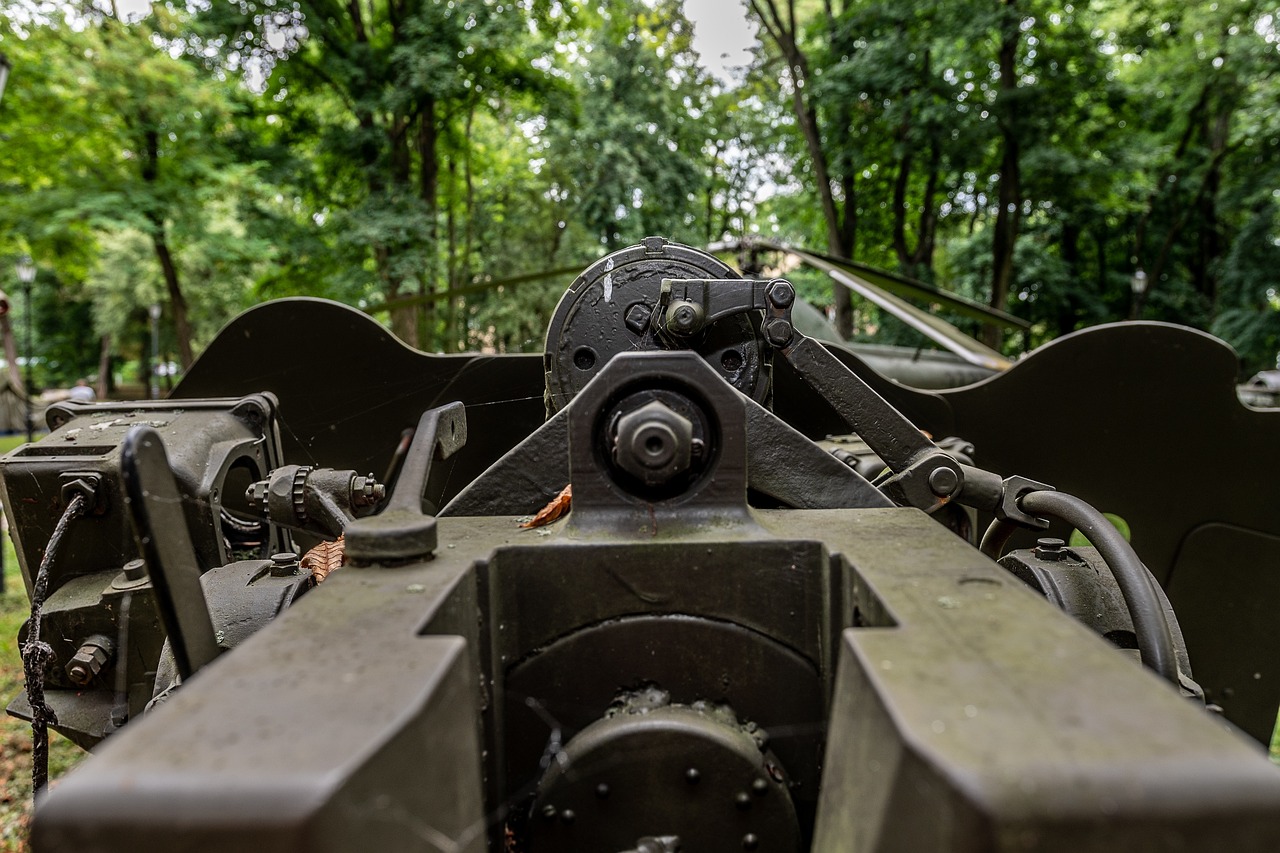
Enhancing Cyber Defense
In today's digital battlefield, where information is as valuable as any weapon, artificial intelligence (AI) is stepping up to the plate to enhance cyber defense like never before. Imagine a world where military systems can not only detect cyber threats but also predict and neutralize them before they wreak havoc. This isn't science fiction; it's the reality we're moving towards. With the power of AI, defense organizations are transforming their cybersecurity measures into proactive, intelligent systems capable of adapting to the ever-evolving landscape of cyber threats.
AI's ability to analyze vast amounts of data in real-time is a game-changer. Traditional cybersecurity measures often rely on predefined rules and patterns, making them vulnerable to sophisticated attacks. However, AI systems can learn from previous incidents, identify anomalies, and even understand the behavior of potential attackers. This means that as new threats emerge, AI can adapt its defenses accordingly, making it a crucial asset in safeguarding military networks.
One of the most compelling aspects of AI in cyber defense is its predictive capabilities. By utilizing machine learning algorithms, AI can analyze historical data to forecast potential vulnerabilities and attacks. For instance, if a specific type of malware has been trending in the cyber underworld, AI can alert defense teams before it has a chance to infiltrate their systems. This proactive approach not only saves time but also resources, allowing military personnel to focus on more strategic tasks rather than constantly reacting to threats.
Moreover, AI enhances incident response times significantly. In the event of a cyber breach, AI-driven systems can automatically initiate countermeasures, such as isolating affected systems or deploying patches, often before human operators are even aware of the issue. This rapid response is critical in minimizing damage and ensuring that operations can continue smoothly.
To illustrate the impact of AI on cyber defense, consider the following table that outlines key benefits:
| Benefit | Description |
|---|---|
| Real-Time Threat Detection | AI systems can analyze network traffic in real-time to identify and respond to threats instantly. |
| Predictive Analysis | By learning from past incidents, AI can predict potential vulnerabilities and attacks. |
| Automated Response | AI can initiate automatic countermeasures to mitigate threats, reducing response time. |
| Resource Efficiency | AI optimizes resource allocation, allowing human operators to focus on strategic initiatives. |
However, while AI is revolutionizing cyber defense, it also brings its own set of challenges. As these systems become more integrated into military operations, concerns around data privacy, security vulnerabilities, and even the potential for AI to be targeted by cyber-attacks arise. It is crucial for military organizations to not only invest in AI technologies but also in robust security measures to protect these systems from becoming liabilities.
In conclusion, AI is not just an enhancement; it's a necessity in modern cyber defense strategies. As we continue to navigate the complexities of the digital age, embracing AI will be pivotal in ensuring the security and integrity of military operations. The future of defense is not only about weaponry and tactics but also about how effectively we can protect our digital assets in an increasingly hostile cyber environment.
- How does AI improve cyber defense? AI enhances cyber defense by providing real-time threat detection, predictive analysis, and automated incident response, allowing for a more proactive approach to cybersecurity.
- What are the main challenges of using AI in cyber defense? Challenges include data privacy concerns, potential vulnerabilities in AI systems, and the risk of AI becoming a target for cyber-attacks.
- Can AI replace human cybersecurity experts? While AI can automate many processes, human expertise remains essential for strategic decision-making and handling complex situations.

Logistics and Supply Chain Optimization
In today's fast-paced and ever-evolving military landscape, logistics and supply chain management play a crucial role in ensuring that defense operations run smoothly and efficiently. With the integration of artificial intelligence (AI), the optimization of logistics has reached unprecedented levels. Imagine a world where military resources are delivered right on time, with minimal waste and maximum efficiency. This is not just a dream; it's becoming a reality thanks to AI technologies.
AI applications in logistics are transforming how military organizations handle everything from inventory management to transportation. By leveraging advanced algorithms, AI can analyze vast amounts of data to predict demand, optimize routes, and streamline the entire supply chain process. For instance, when troops are deployed in remote areas, AI can ensure that essential supplies such as food, ammunition, and medical equipment are delivered swiftly and accurately. This capability not only enhances operational readiness but also saves lives.
One of the most significant advantages of AI in logistics is its ability to provide real-time insights. By utilizing data from various sources, such as satellite imagery and sensor networks, military planners can gain a comprehensive view of their supply chain. This visibility allows them to identify potential bottlenecks or delays, enabling proactive measures to be taken before issues arise. For example, if a particular route is compromised due to enemy activity, AI can quickly reroute supplies to ensure that troops continue to receive the support they need without interruption.
Moreover, predictive analytics plays a vital role in logistics optimization. By analyzing historical data and current trends, AI can forecast future needs, allowing military logistics teams to prepare accordingly. This not only minimizes the risk of shortages but also reduces excess inventory, which can be costly and inefficient. In essence, AI helps create a leaner, more responsive supply chain that can adapt to the dynamic nature of military operations.
To illustrate the impact of AI on logistics, consider the following table that highlights key areas of improvement:
| Logistics Aspect | Traditional Approach | AI-Enhanced Approach |
|---|---|---|
| Inventory Management | Manual tracking and reordering | Automated tracking with predictive analytics |
| Route Optimization | Static route planning | Dynamic routing based on real-time data |
| Resource Allocation | Reactive allocation | Proactive resource distribution using AI algorithms |
| Emergency Response | Delayed response times | Immediate rerouting and resourcing based on AI analysis |
Another critical aspect of logistics optimization is predictive maintenance. By utilizing AI to monitor the condition of vehicles and equipment, military organizations can anticipate failures before they occur. This proactive approach not only minimizes downtime but also extends the lifespan of critical assets. Imagine a scenario where a transport vehicle is scheduled for a mission, but AI detects an impending mechanical issue. Instead of risking failure during a crucial operation, maintenance can be performed in advance, ensuring that the vehicle is mission-ready.
Additionally, AI-driven algorithms are instrumental in optimizing resource allocation. By analyzing various factors such as troop movements, mission requirements, and available assets, AI can ensure that personnel and equipment are utilized efficiently. This optimization not only improves overall effectiveness during missions but also enhances the sustainability of military operations. In an era where resources are often limited, making the most of what is available is paramount.
In conclusion, the integration of AI in logistics and supply chain optimization is revolutionizing military operations. By providing real-time insights, predictive analytics, and enhanced resource allocation, AI is paving the way for a more efficient and effective defense strategy. As we look to the future, it's clear that embracing these technologies will be essential for maintaining a competitive edge in an increasingly complex global landscape.
- How does AI improve logistics in military operations?
AI enhances logistics by providing real-time data analysis, predictive analytics, and optimizing resource allocation, ensuring timely delivery of supplies. - What are the benefits of predictive maintenance in military logistics?
Predictive maintenance helps to minimize downtime and extend the lifespan of critical equipment by anticipating failures before they occur. - Can AI help in emergency situations?
Yes, AI can quickly analyze data to reroute resources and respond to emergencies more effectively, ensuring that troops receive the support they need without delay.

Predictive Maintenance
In the realm of modern defense, has emerged as a game-changer, leveraging the power of artificial intelligence to keep military equipment in peak condition. Imagine a world where military vehicles, aircraft, and naval ships can anticipate their own maintenance needs before a breakdown occurs. This isn’t just a futuristic dream; it's a reality made possible by AI. By analyzing vast amounts of data from sensors embedded in equipment, predictive maintenance algorithms can forecast potential failures and suggest timely interventions. This proactive approach not only prevents costly downtime but also enhances the overall operational readiness of defense forces.
At its core, predictive maintenance utilizes machine learning and data analytics to identify patterns and anomalies in equipment performance. For instance, if a fighter jet's engine shows signs of wear based on temperature fluctuations and vibration data, the system can alert maintenance crews to address the issue before it leads to a catastrophic failure. This capability is particularly crucial in military operations, where equipment reliability can mean the difference between mission success and failure.
Moreover, the benefits of predictive maintenance extend beyond just operational efficiency. By reducing the frequency of unplanned repairs, military organizations can significantly cut costs associated with emergency maintenance and parts replacement. The table below illustrates the potential cost savings and efficiency improvements that can be achieved through the implementation of predictive maintenance in defense:
| Metric | Traditional Maintenance | Predictive Maintenance |
|---|---|---|
| Average Downtime (hours) | 50 | 20 |
| Maintenance Cost ($) | 100,000 | 70,000 |
| Equipment Lifespan (years) | 7 | 10 |
As we delve deeper into the intricacies of predictive maintenance, it's essential to recognize that this approach also fosters a culture of innovation within military organizations. By embracing AI-driven solutions, defense sectors are not only enhancing their equipment management strategies but also paving the way for a more agile and responsive military force. In a landscape where technology is advancing at breakneck speed, staying ahead of the curve is paramount, and predictive maintenance is a crucial component of that strategy.
In conclusion, the integration of predictive maintenance into defense operations signifies a monumental shift towards a more proactive and efficient military infrastructure. As we continue to harness the capabilities of AI, the potential for improved equipment reliability and enhanced operational readiness is boundless. The question remains: how quickly can military organizations adapt to this transformative technology and fully realize its benefits?
- What is predictive maintenance? Predictive maintenance refers to the use of AI and data analytics to predict when equipment will require maintenance, thereby preventing unexpected failures.
- How does predictive maintenance benefit military operations? It enhances operational readiness, reduces downtime, and cuts maintenance costs by addressing issues before they lead to failures.
- What technologies are involved in predictive maintenance? Key technologies include machine learning, data analytics, and IoT sensors that monitor equipment performance in real-time.
- Can predictive maintenance be applied to all military equipment? While it can be applied to various types of military equipment, the effectiveness may vary based on the complexity and data availability of each system.

Resource Allocation
In the complex world of military operations, is akin to conducting a symphony where every note must be perfectly timed and positioned to create harmony. With the advent of artificial intelligence, military organizations are now equipped with sophisticated algorithms that enhance their ability to allocate resources effectively. Imagine a chess game where each piece is moved not just based on the current state of play, but also on predictive models that forecast the opponent's next moves. This is the essence of AI-driven resource allocation in defense.
AI systems analyze vast amounts of data in real-time, allowing military leaders to make informed decisions on how to deploy personnel, equipment, and supplies. These algorithms consider various factors such as mission objectives, environmental conditions, and the availability of resources, ensuring that every asset is utilized to its fullest potential. For instance, during a humanitarian mission, AI can optimize the distribution of medical supplies and personnel to areas most in need, thereby maximizing impact.
Furthermore, AI enhances the efficiency of logistics by predicting demand and identifying potential bottlenecks before they occur. This proactive approach not only saves time but also reduces costs, which is crucial in defense budgets that are often stretched thin. By leveraging predictive analytics, military organizations can avoid overstocking or understocking critical supplies, ensuring that they are always prepared for any scenario.
To illustrate the impact of AI on resource allocation, consider the following table that outlines key benefits:
| Benefit | Description |
|---|---|
| Improved Efficiency | AI algorithms streamline processes, reducing the time required for resource deployment. |
| Cost Reduction | By optimizing supply chains, AI helps lower operational costs. |
| Enhanced Readiness | AI ensures that resources are always available when and where they are needed. |
| Data-Driven Decisions | AI provides actionable insights based on real-time data analysis. |
In conclusion, the integration of AI into resource allocation processes not only enhances operational effectiveness but also supports the overall mission of military organizations. By ensuring that resources are allocated wisely, armed forces can maintain a strategic advantage, respond swiftly to emerging threats, and ultimately save lives. As we continue to explore the capabilities of AI in defense, it becomes increasingly clear that the future of military operations will be shaped by intelligent systems that optimize every aspect of resource management.
- What is resource allocation in military operations? Resource allocation refers to the process of distributing available resources, such as personnel, equipment, and supplies, to achieve mission objectives efficiently.
- How does AI improve resource allocation? AI improves resource allocation by analyzing data to predict needs, optimize logistics, and ensure timely deployment of resources, thereby enhancing operational effectiveness.
- What are the benefits of AI-driven resource allocation? Benefits include improved efficiency, cost reduction, enhanced readiness, and data-driven decision-making.
Frequently Asked Questions
- What is the role of AI in modern defense systems?
AI is transforming defense systems by enhancing operational efficiency, improving surveillance capabilities, and shaping military strategies. It allows for real-time data analysis and decision-making, which is crucial in high-stakes environments.
- How does AI improve surveillance in military operations?
AI technologies enable advanced surveillance systems that can analyze vast amounts of data quickly. They enhance object recognition and threat detection, providing military personnel with better situational awareness and the ability to respond to threats more effectively.
- What are autonomous weapons systems and their advantages?
Autonomous weapons systems are military technologies that can operate without human intervention. They offer advantages like precision targeting and reduced risk to soldiers, but they also raise ethical concerns regarding accountability and decision-making in combat situations.
- What ethical implications arise from using AI in defense?
The use of AI in defense raises several ethical dilemmas, including questions about accountability for actions taken by autonomous systems, the potential for unintended consequences in warfare, and the moral implications of delegating life-and-death decisions to machines.
- How are governments addressing the regulatory challenges of AI in defense?
Governments and international bodies are working to establish regulations that balance innovation with ethical considerations. This includes creating frameworks that govern the use of AI technologies in military applications while ensuring accountability and safety.
- What is the public perception of autonomous weapons?
Public opinion significantly influences policies regarding autonomous weapons. Concerns about safety, ethics, and the potential for misuse shape how governments approach the integration of AI in military operations, often leading to calls for stricter regulations.
- How does AI enhance cybersecurity in defense?
AI plays a crucial role in strengthening cybersecurity by enabling defense systems to predict, detect, and respond to cyber threats more effectively. It helps in identifying vulnerabilities and automating responses to potential attacks, thereby enhancing overall security.
- In what ways does AI optimize logistics and supply chains in defense?
AI applications streamline logistics by ensuring timely delivery of resources and enhancing operational readiness. They analyze data to predict needs and optimize supply chain processes, which is vital for maintaining efficiency in defense environments.
- What is predictive maintenance and its benefits in military operations?
Predictive maintenance utilizes AI to analyze data from equipment to predict failures before they occur. This approach minimizes downtime, enhances the lifespan of critical military equipment, and ensures that resources are always available when needed.
- How does AI assist in resource allocation during military missions?
AI-driven algorithms optimize resource allocation by analyzing mission requirements and available assets. This ensures efficient use of personnel and equipment, ultimately improving the effectiveness of military operations and mission outcomes.





